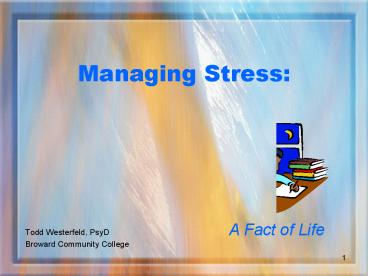Managing Stress: - PowerPoint PPT Presentation
1 / 21
Title:
Managing Stress:
Description:
Decrease negative thinking; increase positive thinking. Monitor your anger level--strive to reduce your anger if necessary. Animals can help! – PowerPoint PPT presentation
Number of Views:61
Avg rating:3.0/5.0
Title: Managing Stress:
1
Managing Stress
- Todd Westerfeld, PsyD
- Broward Community College
A Fact of Life
2
Stress An Introduction
- Stress is part of our everyday life. Living in a
fast-paced, technological society with myriad
demands upon our time, the majority of students
can state I am stressed out.
3
Todays Agenda
This workshop will cover the following topics
- What is stress?
- Where does stress come from?
- How can I tell when I am under stress?
- What are some of the ways stress affects my body,
my mind, or my mood? - How can I better manage the stress in my life?
4
What is Stress?
- In his 1974 book Stress Without Distress, Hans
Selye defines stress as ones reaction to
life events the nonspecific response of the
body to any demand made upon it
5
What is Stressful to You May Not be Stressful to
Me!
- Our genetic and physical makeup, growing-up
experiences, early life experiences with
stressful events, and patterns of positive or
negative thinking influences how we react to
potentially stressful experiences.
6
Give a Talk!
- If I ask you to prepare and present a program to
400 people--on a stage with a microphone--how
would you react? With enthusiasm or with
reservation or with fear? The exact same
situation is energy-producing for one person and
stressful to another.
7
Types of Stress
- Eustress Positive Stress
- Distress Negative Stress
8
Where Does Stress Come From?
9
How Can I Know When Im Under Stress?
- Physical symptoms of stress may include
- stomach or GI upset
- headaches
- backaches
- muscle tension
- change in eating habits lost of appetite or
overeating - restlessness/irritability
- fatigue
10
How Can I Know When Im Under Stress?
- Behavioral reactions to stress may include
- decreased ability to concentrate
- memory problems/forgetfulness
- making more mistakes
- clumsiness being accident prone
- increased illness
- more frequent use of cigarettes, alcohol, or
drugs - withdrawal from usual activities
- sleep disturbance
11
How Can I Know When Im Under Stress?
- Psychological reactions to stress may include
- increased anger
- tearfulness
- emotional outbursts
- excessive fear
- worry
- confusion
- increased anxiety
- ruminative/obsessive thoughts
- decreased self-confidence
- depression
12
How Can I Know When Im Under Stress?
- Stress takes its toll on our bodies
(stomachaches, headaches, backaches) on our
interest in, productivity, and enjoyment of life
and work and may contribute to more serious
conditions such as ulcers, high blood pressure,
heart attack, or stroke.
13
When I know I am under stress, what can I do to
manage it? Select three of the following
options to implement this week!
14
Stress Management Strategies
- Exercise - regular, routine, and aerobic.
- Support system - friends - community involvement.
- Express yourself - talk it over with family,
friends, counselors, clergy. - Eat right - select a healthful diet high in
fruits and vegetables. Reduce caffeine (2 1/2
cups of coffee doubles the epinephrine level).
Consider comfort foods as appropriate. - Deep muscle relaxation.
15
Stress Management Strategies continued...
- Therapeutic massage.
- Meditation may decrease your heart rate, lower
your blood pressure, and reduce your oxygen
consumption. It is considered a natural antidote
to tension. - Self-hypnosis
- Rhythmic breathing--deep, slow, relaxed breathing
- Maintain regular and consistent sleep patterns.
Get enough sleep to wake up refreshed.
16
Stress Management Strategies continued...
- Biofeedback techniques can help up to 80 of
migraine headache sufferers. Acupuncture can
also be effective. - Prayer and religious commitment.
- Develop your potential and special interests
sports, literature, music, dance, languages,
technical skills, crafts. - Vacations, mini-vacations, or mind vacations
(where you sit quietly, close your eyes, and go
to the mountains or seaside). - Balance work and recreation.
17
Stress Management Strategies continued...
- Be aware of natural surroundings, observe nature,
spend time in nature. - Decorate to de-stress your home. Limit large
blocks of red or yellow. - Learn the value of giving away. Visual clutter
can lead to mental clutter. - Identify goals and work toward them.
18
Stress Management Strategies continued...
- Learn to be proactive, not reactive. Stop
procrastinating. - Learn positive problem-solving techniques
- delay gratification
- take one step at a time--break problems into
smaller parts. - Take direct action to address stressful
situations. - Minimize time spent with people who contribute to
your psychological distress. - Seek out people who contribute to your
psychological health.
19
Stress Management Strategies continued...
- Incorporate humor into your life.
- Listen to music.
- Put some energy into your appearance, your dress,
hairstyle, or skin. - Decrease negative thinking increase positive
thinking. - Monitor your anger level--strive to reduce your
anger if necessary. - Animals can help!
20
Stress Management Strategies continued...
- Sit quietly for a few minutes each day.
- Select a lifestyle that fits your psychological
needs.
From Kathleen H. Staley, Ph.D.
21
- For more information on how to manage stress,
call the BCC Advisement/Counseling Department at
954-201-8875 to schedule an appointment with one
of our counselors. We can help you accurately
identify the stressors in your life and assist
you in taking action to reduce the stress.































